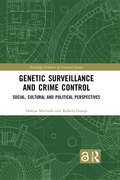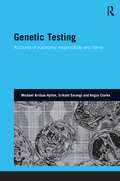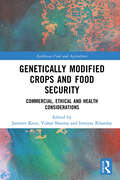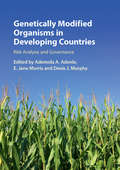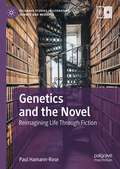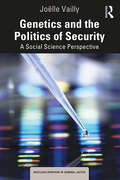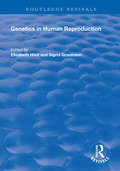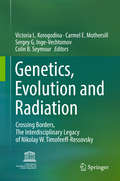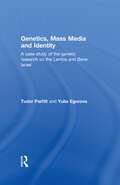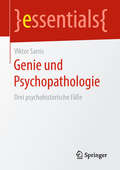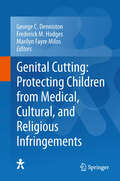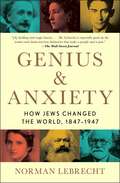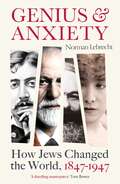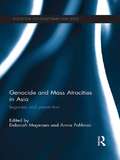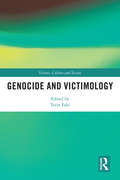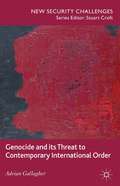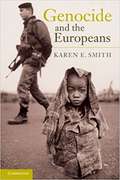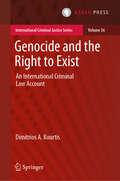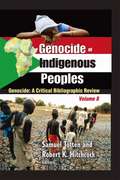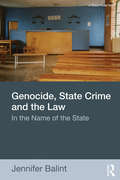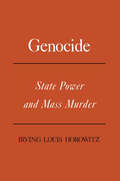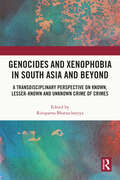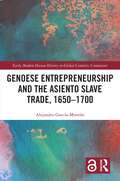- Table View
- List View
Genetic Surveillance and Crime Control: Social, Cultural and Political Perspectives (Routledge Frontiers of Criminal Justice)
by Helena Machado Rafaela GranjaGenetic Surveillance and Crime Control presents a new empirical and conceptual framework for understanding trends of genetic surveillance in different countries in Europe and in other jurisdictions around the world. The use of DNA or genome for state-level surveillance for crime governance is becoming the norm in democratic societies. In the post-DNA, contemporary modes of criminal identification are gradually changing through the increasing expansion of transnational sharing of DNA data, along with the development of highly controversial genetic technologies that pose acute challenges to privacy and generate fears of discrimination, racism and stigmatization. Some questions that guide this book are: How is genetic surveillance in the governance of crime intertwined with society, ethics, culture, and politics? What are the views and expectations of diverse stakeholders –scientists, police agencies, and non-governmental organizations? How can social sciences research about genetic surveillance accommodate socio-cultural and historical differences, and be sensitive to specificities of post-authoritarian societies in Europe? Taking an interdisciplinary approach focused on challenges to genetic privacy, human rights and citizenship in contemporary societies , this book will be of interest to students and scholars of social studies of science and technology, sociology, criminology, law and policing, international relations and forensic sciences.
Genetic Testing: Accounts of Autonomy, Responsibility and Blame (Genetics and Society)
by Srikant Sarangi Michael Arribas-Ayllon Angus ClarkeAdvances in molecular genetics have led to the increasing availability of genetic testing for a variety of inherited disorders. While this new knowledge presents many obvious health benefits to prospective individuals and their families it also raises complex ethical and moral dilemmas for families as well as genetic professionals. This book explores the ways in which genetic testing generates not only probabilities of potential futures, but also enjoys new forms of social, individual and professional responsibility. Concerns about confidentiality and informed consent involving children, the assessment of competence and maturity, the ability to engage in shared decision-making through acts of disclosure and choice, are just some of the issues that are examined in detail.
Genetically Modified Crops and Food Security: Commercial, Ethical and Health Considerations (Earthscan Food and Agriculture)
by Vishal Sharma Jasmeet Kour Imtiyaz KhandayThis book reviews a wide-range of genetically modified (GM) crops to understand how they are produced, the impacts on the agricultural industry, and their potential for improving food security. The production of GM crops has now become an invaluable asset in the agricultural toolbox. With a significant portion of the world suffering from hunger and poverty, this book examines how food security can be achieved through GM crops. A wide variety of crops are examined, from the earliest developments of GM tomatoes and potatoes to recent interest in the development of low-cost, high yielding biofuels, such as microalgae. Chapters also discuss the role of GM crops in pest management and the consequential reduction in the use of insecticides. Overall, this book provides an important synthesis of GM crops from their commercial value to the agricultural industry, as well as their potential for improving food security. This book will be of great interest to students and scholars of agricultural engineering, crop science, food biotechology, food security, and those interested in food and agriculture and sustainable development more broadly.
Genetically Modified Organisms in Developing Countries: Risk Analysis and Governance
by Murphy Morris Adenle Ademola A. E. Jane Denis J."Bringing together the ideas of experts from around the world, this incisive text offers cutting-edge perspectives on the risk analysis and governance of genetically modified organisms (GMOs), supporting effective and informed decision-making in developing countries. Comprised of four comprehensive sections, this book covers: Integrated risk analysis and decision making, giving an overview of the science involved and examining risk analysis methods that impact decision-making on the release of GMOs, particularly in developing countries. Diversification of expertise involved in risk analysis and practical ways in which the lack of expertise in developing countries can be overcome. Risk analysis based regulatory systems and how they can be undermined by power relationships and socio-political interests, as well as strategies for improving GMO policy development and regulatory decision-making. Case studies from developing countries providing lessons based on real-world experience that can inform our current thinking"--Provided by publisher.
Genetics and the Novel: Reimagining Life Through Fiction (Palgrave Studies in Literature, Science and Medicine)
by Paul Hamann-RoseGenetics and the Novel: Reimagining Life Through Fiction argues that literary fiction has reimagined life in the age of genetics. The new genetic paradigm has proposed to rewrite core assumptions about such fundamental aspects of life as the nature of kinship and biological connection, human-environmental relations, or the link between biology and art. Investigating major texts of genetic fiction by A. S. Byatt, Ian McEwan, Simon Mawer and Margaret Atwood, this monograph offers the first systematic study of how these assumptions about life itself have been renegotiated through the contemporary novel’s engagement with genetic science. This book identifies a significant new phase in the novel’s aesthetic exploration of life and demonstrates that the novel emerges as the cultural form uniquely positioned to engage both the imaginative and concrete challenges raised by genetic science for the lifeworlds of the new millennium.
Genetics and the Politics of Security: A Social Science Perspective (Routledge Frontiers of Criminal Justice)
by Joëlle VaillyPresenting a social science perspective on the contemporary gaze on the body of the suspect, this book considers how definitions of criminality, offenses, individual rights, and the concepts of identity and difference have been altered by changes in the biological status of the human.Spurred by rapid developments in genetics and information technology, a number of countries, including France, the United States, the United Kingdom, China, and the Netherlands, have considerably expanded their genetic databases used by the police and the criminal justice system. Whilst this makes it possible to compare DNA left at the scene of a crime with that of an individual known to the police, helping to identify individuals for the purposes of court proceedings, these innovations also raise a number of important questions, such as how the relationship between respect for the rights of individuals and the security of populations is discussed, as well as for how long this data should be retained. Genetic analysis also raises concerns related to phenotyping and “biogeographical origin” that could lead to the stigmatization of targeted groups.Offering a comprehensively argued view on how DNA acts not only as a tracker of suspicion but also as a marker of contemporary social developments, Genetics and the Politics of Security will appeal to students and scholars, judiciary personnel, lawyers, police officers, and people with an interest in criminology and the use of genetics in the criminal justice process.
Genetics in Human Reproduction (Routledge Revivals)
by Elisabeth Hildt Sigrid GraumannPublished in 1999, this book discusses issues related to the current and possible future technological progress in genetic technology linked to in vitro fertilization, specifically preimplantation diagnosis and germline gene therapy, from a scientific and medical as well as from a social, juridical and ethical point of view. The 31 contributions are divided into six sections medical and scientific view, personal interests and moral implications, moral rights and duties, social concepts and moral implications, choices and decision making, and justice in health care and legal regulation.
Genetics, Evolution and Radiation
by Victoria L. Korogodina Carmel E Mothersill Colin B. Seymour Sergey G. Inge-VechtomovThis book is dedicated to the great scientist and outstanding individual Nikolay Wladimirovich Timofeeff-Ressovsky. The book brings together a number of brief stories/essays about Timofeeff-Ressovsky including "Stories told by himself", and scientific chapters addressing his major research areas: genetics, radiobiology, radiation ecology and epidemiology, and evolution. Timofeeff-Ressovsky contributed to several fields of biology and established new directions of scientific research. He often repeated the phrase, which would later become famous: "Science should not be approached with the ferocity of wild animals". In keeping with that philosophy, the issues discussed here are still open. Each scientific part starts with a current review; the chapters present leading scientific schools and views. The main theme discussed in the genetics part is mutation variability in the context of linear (replication, transcription, translation) and conformational template processes, and its dependence on phylogenetic group. In turn, the radiobiology chapters focus on the reorganization of DNA, cell, and population variability under low-dose irradiation, sparking indirect processes and adaptive response. The radiation ecology and epidemiology parts present data on the consequences of nuclear plants and related accidents for ecological systems and human beings. Here some approaches to estimating radiation risks are also offered. Evolution laws are demonstrated in the genomic universe, plant-microbe symbiosis, stabilizing and destabilizing (directional) selection. The last essay demonstrates the principles of organization operating in local animal populations, which are approached as social organisms of complex systemic nature. The chapter 'Radiation-Induced Aging and Genetic Instability of Mesenchymal Stem Cells: An Issue for Late Health Effects?' is available open access under a CC BY 4. 0 license. >
Genetics, Mass Media and Identity: A Case Study of the Genetic Research on the Lemba
by Tudor Parfitt Yulia EgorovaThis is the first book to explore the effect of genetic research on the Lemba Judaising community of Southern Africa and the phenomenon of Israelite identity. The science of genetics as relayed by the media is perceived by laymen as being irreproachably objective 'hard science': its disinterested 'scientific' findings appear immensely impressive and may therefore act as a powerful catalyst for change. In this case, an oral tradition cherished by many of the Lemba that they are of Jewish origin appears to be supported by recent DNA testing, which has deeply affected the narrative and religious identity of the group and the way the tribe is perceived in the Western world. International in appeal, this topical text brings together cutting-edge research on the social, cultural and ethical implications of genetics and the study of Judaising movements across the world. This book will be of interest to researchers and students of Jewish history, genetic anthropology, race and ethnicity studies, and religious and cultural studies.
Geniale Frauen in der Wissenschaft: Versteckte Beiträge, die die Welt verändert haben
by Lars JaegerObwohl Frauen schon früh das wissenschaftliche Denken mitgeprägt haben, sichtbar geworden sind sie fast nie. Dieses Ungleichgewicht setzt sich bis heute fort, auch wenn es aktuell weit mehr Wissenschaftlerinnen gibt als jemals zuvor. Lars Jaeger spannt einen Bogen von der Antike bis heute und porträtiert in essayartigen Einführungen das Leben und Wirken der wohl bedeutendsten weiblichen Naturwissenschaftlerinnen und Mathematikerinnen. Von Hypatia von Alexandria über Émilie du Châtelet und Emmy Noether bis hin zu Lisa Randall, sie alle haben Großes geleistet, die Wissenschaft entscheidend vorangebracht und konnten dennoch oft nicht aus dem Schatten ihrer männlichen Kollegen treten.Neben den spannenden Porträts der einzelnen Wissenschaftlerinnen sowie einer detaillierten und anschaulichen Darstellung ihrer wissenschaftlichen Leistungen beleuchtet dieses Sachbuch auch das Geschlechterverhältnis in der Wissenschaft, das sich nur quälend langsam zugunsten eines fairen Verhältnisses für die Frauen entwickelt.
Genie und Psychopathologie: Drei psychohistorische Fälle (essentials)
by Viktor SarrisDieses essential behandelt die psychischen Erkrankungen von Robert Schumann, Vincent van Gogh und Virginia Woolf - diesen Genialen der Musik, Malerei und Literatur - aus psychohistorischer Sicht. Es stellt die Frage, wie diese drei gro#65533;en Pers#65533;nlichkeiten mit ihren schweren Depressionen umgegangen sind. Ihr Schicksal ist neben der klinisch-medizinischen Seite auch unter einem psychologischen und anthropologischen Blickwinkel von Interesse. Das Thema wird im Rahmen eines biopsychosozialen Modells im Zusammenhang mit der sogenannten Mad-Genius-Hypothese behandelt. Dabei steht die zu beachtende Problematik einer Stigmatisierung und gesellschaftlichen Ausgrenzung von Genialen und psychisch Labilen bzw. Kranken ebenfalls im Raum.
Genital Cutting: Protecting Children from Medical, Cultural, and Religious Infringements
by Frederick M. Hodges Marilyn Fayre Milos George C. DennistonThis volume contains the proceedings of the 10th International Symposium on Circumcision, Genital Integrity, and Human Rights. Authors are international experts in their fields, and the book contains the most up-to-date information on the issue of genital cutting of infants and children from medical, legal, bioethical, and human rights perspectives.
Genius & Anxiety: How Jews Changed the World, 1847-1947
by Norman LebrechtA unique chronicle of the years 1847-1947, the century when the Jewish people changed the world—and it changed them.In a hundred-year period, a handful of men and women changed the way we see the world. Many of them are well known—Marx, Freud, Proust, Einstein, Kafka. Others have vanished from collective memory despite their enduring importance in our daily lives. Without Karl Landsteiner, for instance, there would be no blood transfusions or major surgery. Without Paul Ehrlich, no chemotherapy. Without Siegfried Marcus, no motor car. Without Rosalind Franklin, genetic science would look very different. Without Fritz Haber, there would not be enough food to sustain life on earth. What do these visionaries have in common? They all had Jewish origins. They all had a gift for thinking in wholly original, even earth-shattering ways. In 1847 the Jewish people made up less than 0.25% of the world&’s population, and yet they saw what others could not. How? Why? Norman Lebrecht has devoted half of his life to pondering and researching the mindset of the Jewish intellectuals, writers, scientists, and thinkers who turned the tides of history and shaped the world today as we know it. In Genius & Anxiety, Lebrecht begins with the Communist Manifesto in 1847 and ends in 1947, when Israel was founded. This robust, magnificent volume, beautifully designed, is an urgent and necessary celebration of Jewish genius and contribution.
Genius and Anxiety: How Jews Changed the World, 1847–1947
by Norman LebrechtMarx, Freud, Proust, Einstein, Bernhardt and Kafka. Between the middle of the nineteenth and twentieth centuries a few dozen men and women changed the way we see the world. But many have vanished from our collective memory despite their enduring importance in our daily lives. Without Karl Landsteiner, for instance, there would be no blood transfusions or major surgery. Without Paul Ehrlich no chemotherapy. Without Siegfried Marcus no motor car. Without Rosalind Franklin genetic science would look very different. Without Fritz Haber there would not be enough food to sustain life on earth. These visionaries all have something in common – their Jewish origins and a gift for thinking outside the box. In 1847 the Jewish people made up less than 0.25% of the world&’s population, and yet they saw what others could not. How?
Genocide and Mass Atrocities in Asia: Legacies and Prevention (Routledge Contemporary Asia Series)
by Deborah Mayersen Annie PohlmanThe twentieth century has been labelled the ‘century of genocide’, and according to estimates, more than 250 million civilians were victims of genocide and mass atrocities during this period. This book provides one of the first regional perspectives on mass atrocities in Asia, by exploring the issue through two central themes. Bringing together experts in genocide studies and area specialists, the book looks at the legacy of past genocides and mass atrocities, with case studies on East Timor, Cambodia and Indonesia. It explores the enduring legacies of trauma and societal divisions, the complex and continuing impacts of past mass violence, and the role of transitional justice in the aftermath of mass atrocities in Asia. Understanding these complex legacies is crucial for the region to build a future that acknowledges the past. The book goes on to consider the prospects and challenges for preventing future mass atrocities in Asia, and globally. It discusses both regional and global factors that may impact on preventing future mass atrocities in Asia, and highlights the value of a regional perspective in mass atrocity prevention. Providing a detailed examination of genocide and mass atrocities through the themes of legacies and prevention, the book is an important contribution to Asian Studies and Security Studies.
Genocide and Mass Violence
by Devon E. Hinton Alexander L. HintonWhat are the legacies of genocide and mass violence for individuals and the social worlds in which they live, and what are the local processes of recovery? Genocide and Mass Violence aims to examine, from a cross-cultural perspective, the effects of mass trauma on multiple levels of a group or society and the recovery processes and sources of resilience. How do particular individuals recall the trauma? How do ongoing reconciliation processes and collective representations of the trauma impact the group? How does the trauma persist in 'symptoms'? How are the effects of trauma transmitted across generations in memories, rituals, symptoms, and interpersonal processes? What are local healing resources that aid recovery? To address these issues, this book brings into conversation psychological and medical anthropologists, psychiatrists, psychologists and historians. The theoretical implications of the chapters are examined in detail using several analytic frameworks.
Genocide and Victimology (Victims, Culture and Society)
by Yarin EskiGenocide and Victimology examines genocide in its diverse features, from different yet connected perspectives, to offer an interdisciplinary, victimological imagination of genocide. It will include in its exploration critical and cultural victimologies and criminologies of genocide, accompanied by, and recognising, the rich scholarship on genocide in the fields of religion and history, theatre studies and photography, philosophy and existentialism, post-colonialism, and ethnography and biography. Bringing together theory with empirical research and drawing on a range of case studies, such as the Treblinka extermination camp, the Bosnian and Rwandan genocides, the Sagkeeng First Nation in Manitoba, Canada, and genocidal violence in Syria and Iraq, this book engages the victimological imagination towards an interdisciplinary, cosmopolitan victimology of genocide. Bundled and intertwined, the wide yet integrated variety of perspectives on genocide gives readers a victimological kaleidoscope to discover, and for victimology hitherto, unexplored theory and methodology. This way, readers can develop their own more epistemologically, theoretically, and methodologically robust victimology of genocide—a victimology of genocide as envisioned by Nicole Rafter. The book hopes to canvas an understanding and a starting point for a diverse appreciation of genocide victimhood and survivorship from which the real post-genocidal harms and sites, post-traumatic stress disorder, courts and tribunals, and overall meaningful justice will benefit. Written in a clear and direct style, this book will appeal to students and scholars in criminology, sociology, cultural studies, philosophy, history, religious studies, English literature, and all those concerned with not repeating a history of genocide.
Genocide and its Threat to Contemporary International Order: Consent And The Controlled Body (New Security Challenges)
by A. GallagherFor far too long the discipline of International Relations has failed to engage with the study of genocide. This is despite the fact that genocide holds a direct relationship with the central concepts of international relations: the state, war, power, and security. This bold, innovative and unique book sets out to tackle this by bringing the concept of genocide into the discipline of IR, via the English School, in order to theorise the relationship between genocide, justice, and order. Drawing on a wide-range of primary and secondary interdisciplinary material from International Relations, Genocide Studies, Security Studies, International Law, History, Politics and Political Theory, this book aims to understand genocide within the context of International Relations and the implications that this has on policymaking. Gallagher identifies the obstacles and challenges involved in bringing the study of genocide into IR and uniquely analyses the impact of genocide on the ordering structure of international society.
Genocide and the Europeans
by Karen E. SmithGenocide is one of the most heinous abuses of human rights imaginable, yet reaction to it by European governments in the post-Cold War world has been criticised for not matching the severity of the crime. European governments rarely agree on whether to call a situation genocide, and their responses to purported genocides have often been limited to delivering humanitarian aid to victims and supporting prosecution of perpetrators in international criminal tribunals. More coercive measures - including sanctions or military intervention - are usually rejected as infeasible or unnecessary. This book explores the European approach to genocide, reviewing government attitudes towards the negotiation and ratification of the 1948 Genocide Convention and analysing responses to purported genocides since the end of the Second World War. Karen E. Smith considers why some European governments were hostile to the Genocide Convention and why European governments have been reluctant to use the term genocide to describe atrocities ever since.
Genocide and the Right to Exist: An International Criminal Law Account (International Criminal Justice Series #36)
by Dimitrios A. KourtisThis book delves into the complexities of genocide as a legal concept, offering a fresh perspective by exploring the rights of groups to exist under international criminal law. It presents an in-depth analysis of group rights, challenging traditional interpretations within the context of the Genocide Convention. By focusing on the conceptual and practical implications of recognizing groups as rights-holders, this work introduces a nuanced understanding of collective rights and their enforcement. What sets this approach apart is its thorough examination of both the theoretical foundations and the operational aspects of international law concerning genocide. The book provides a critical assessment of various legal theories, addressing how these can be reconciled with the dynamic nature of international human rights practices. It also highlights the potential for these theoretical frameworks to impact the protection of vulnerable groups on a global scale. The scope of this work is broad yet detailed, encompassing an analysis that will be invaluable for legal practitioners, scholars, and policymakers. It systematically addresses the ambiguities and challenges in defining and prosecuting genocide, offering strategic insights into the enhancement of legal frameworks to prevent such atrocities. The book incorporates primary archival research that brings to light new evidence on the drafting of the Genocide Convention, including cases such as that of the Greek children, which have previously been underexplored. The primary audience for the work includes academics and students in the fields of international law, international criminal law, criminal law, human rights, and genocide studies, as well as diplomats, policy-makers, legal professionals, historians, sociologists, anthropologists, philosophers specializing in genocide, and genocide scholars in general. The insights provided will be crucial for anyone committed to advancing the understanding and implementation of international law protecting group rights. Dimitrios Kourtis holds a PhD and is a Post-doctoral Researcher and Teaching Fellow in the Department of International Studies at the Faculty of Law of the Aristotle University in Thessaloniki, Greece.
Genocide of Indigenous Peoples: A Critical Bibliographic Review (Genocide: A Critical Bibliographic Review Ser.)
by Samuel Tottena and Robert K. HitchcockAn estimated 350 to 600 million indigenous people reside across the globe. Numerous governments fail to recognize its indigenous peoples living within their borders. It was not until the latter part of the twentieth century that the genocide of indigenous peoples became a major focus of human rights activists, non-governmental organizations, international development and finance institutions such as the United Nations and the World Bank, and indigenous and other community-based organizations. Scholars and activists began paying greater attention to the struggles between Fourth World peoples and First, Second, and Third World states because of illegal actions of nation-states against indigenous peoples, indigenous groups' passive and active resistance to top-down development, and concerns about the impacts of transnational forces including what is now known as globalization. This volume offers a clear message for genocide scholars and others concerned with crimes against humanity and genocide: much greater attention must be paid to the plight of all peoples, indigenous and otherwise, no matter how small in scale, how little-known, how "invisible" or hidden from view.
Genocide, State Crime and the Law: In the Name of the State
by Jennifer BalintGenocide, State Crime and the Law critically explores the use and role of law in the perpetration, redress and prevention of mass harm by the state. In this broad ranging book, Jennifer Balint charts the place of law in the perpetration of genocide and other crimes of the state together with its role in redress and in the process of reconstruction and reconciliation, considering law in its social and political context. The book argues for a new approach to these crimes perpetrated 'in the name of the state' - that we understand them as crimes against humanity with particular institutional dimensions that law must address to be effective in accountability and as a basis for restoration. Focusing on seven instances of state crime - the genocide of the Armenians by the Ottoman state, the Holocaust and Nazi Germany, Cambodia under the Khmer Rouge, apartheid South Africa, Ethiopia under Mengistu and the Dergue, the genocide in Rwanda, and the conflict in the former Yugoslavia - and drawing on others, the book shows how law is companion and collaborator in these acts of nation-building by the state, and the limits and potentials of law's constitutive role in post-conflict reconstruction. It considers how law can be a partner in destruction yet also provide a space for justice. An important, and indeed vital, contribution to the growing interest and literature in the area of genocide and post-conflict studies, Genocide, State Crime and the Law will be of considerable value to those concerned with law's ability to be a force for good in the wake of harm and atrocity.
Genocide: State Power and Mass Murder (Issues In Contemporary Civilization Ser.)
by James BaldwinThis book is dedicated to a consideration of genocide in the context of political sociology. It demonstrates that the underlining predicates of sociology give scant consideration to basic issues of life and death in favor of distinctly derivative issues of social structure and social function.
Genocides and Xenophobia in South Asia and Beyond: A Transdisciplinary Perspective on Known, Lesser-known and Unknown Crime of Crimes
by Rituparna BhattacharyyaThis volume foregrounds some of the unknown or lesser-known incidents of xenophobia and genocide from India, Bangladesh, Sri Lanka, South Africa, and Rwanda. It critically analyses the cultural and structural contexts triggering these various forms of genocides and xenophobia, and situates them within modern histories of violence and human tribulations. The book discusses various non-western case studies which include the communal violence incited by anti-CAA protests in Delhi; the expulsion and displacement of Kashmiri Pandits; xenophobic attitudes against illegal immigrants in Assam; genocide in Sylhet during the Liberation War of Bangladesh; the 1994 genocide in Rwanda; and incidences of human rights violations across the world. A comprehensive and transdisciplinary text, the book will be useful for students and researchers of human geography, sociology, political science, social work, anthropology, colonialism and postcolonialism, nationalism, imperialism, human rights, and history.
Genoese Entrepreneurship and the Asiento Slave Trade, 1650–1700 (Early Modern Iberian History in Global Contexts)
by Alejandro García-MontónThis book explains how Genoese entrepreneurs transformed the structures of global trade during the second half of the seventeenth century. The author reconstructs the business network built by the Genoese merchant Domenico Grillo between the 1650s and the 1680s. Grillo’s business interests stretched from the Mediterranean to Pacific South America, traversing and joining the Spanish, Dutch, and English Atlantics. He and his associates created a new business model that was to be emulated by Dutch, French, and English traders in subsequent decades: the monopolistic asientos for the exploitation of the trans-imperial and intra-American slave trade to Spanish America. Offering a connected history of capitalism across trans-continental geographies and different empires, this book challenges established views of a period which has traditionally been interrogated from a northern European mercantile perspective. Cutting across the histories of the slave trade in the Atlantic world, early modern capitalism, and early modern empire, this study has much to offer to students and scholars interested in the agents, economic practices, and geographies of trade that do not easily fit into and therefore disrupt the traditional narratives of the Rise of the West.
